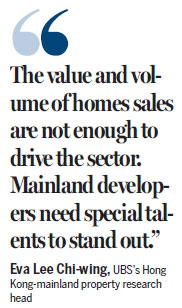SOE overhaul, REITs 'key to builder stocks'
Updated: 2015-08-07 08:40
By Oswald Chan in Hong Kong(HK Edition)
|
|||||||||
UBS says homes sales can no longer lift profits of mainland developers
The restructuring of State-owned enterprises (SOEs) and the ability of developers to exit their real-estate investments are the two key criteria for evaluating mainland property stocks, as the value and volume of homes sales are no longer adequate to drive business growth, says global investment bank UBS.
The Swiss investment bank notes that mainland builders' profits have been squeezed in the past three years. It says that although property prices and sales have risen recently, they might not be enough to substantially lift profit margins in the medium term.
UBS expects mainland developers' profit margins to fall this year arising from price cuts offered in 2014 and, looking forward, profit margins in 2017 will still be 4 percentage points lower the historical average recorded from 2012 to 2014.

Substantial land costs in top-tier cities on the mainland have made developers more cautious in acquiring new land and, hence, this affects the level of land replenishment. The value of land sales has dropped by 38 percent in the first half of this year, and builders have used only 27 percent of their contracted sales proceeds for land acquisition year-to-date for 2015, down from 56 percent in 2013, UBS says.
"The value and volume of homes sales are not enough to drive the sector. Mainland developers need special talents to stand out," UBS's Hong Kong-mainland property research head Eva Lee Chi-wing said on Thursday.
The first criterion for evaluating the performance of mainland developers is the pace of restructuring of SOEs. "The restructuring of SOEs may hasten parent companies in injecting quality assets into listed property arms. Such parental support helps improve credit rating and allows some property companies to enjoy lower funding costs," Lee noted.
The second strategy is for builders to exit property investments by packaging their retail or commercial rental earnings property portfolios into real estate investment trusts (REITs).
"Through REIT listings that endow investors and insurance firms with long-term and constant rental returns, mainland property developers can get a higher market valuation from market analysts when their NAV (net-asset-value) market discount can be narrowed," Lee said.
When the share prices of property companies are trading less than the developers' NAV, property stocks are said to be trading at a discount, which indicates the valuation of property shares is cheap. Hence, narrowing the NAV discount means that property stocks can get a higher valuation. At present, mainland developers' NAV discount hovers around 50 percent.
UBS says it prefers stocks of mainland developers with exposure to first-tier and leading second-tier cities, given the expected improvement in demand/supply balance in these cities this year.
oswald@chinadailyhk.com
(HK Edition 08/07/2015 page8)